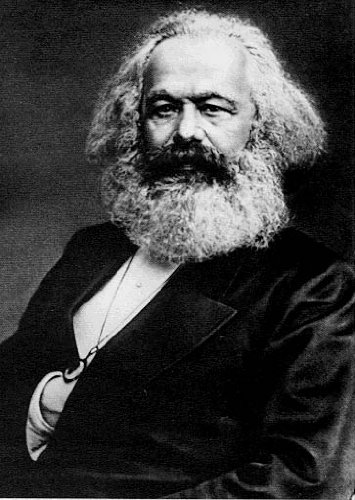カール・マルクスの名言
[1818.5.5 - 1883.3.14]
ドイツの哲学者、経済学者、社会学者、革命家。いわゆる「マルクス主義」の祖であり、科学的社会主義の創始者である。エンゲルスとともに『共産党宣言』を執筆し、歴史が展開し社会が進化するその原動力を物質的、経済的生活に求める立場である「唯物史観」を確立。ドイツの革命運動の促進を図るも挫折し、ロンドンへ亡命。貧困の中で著作を続け、『資本論』発表した。その政治的・哲学的思想は、その後の歴史に多大な影響を及ぼした。著作は他に、『フォイエルバッハに関するテーゼ』『ドイツ・イデオロギー』『ルイ・ボナパルトのブリュメール18日』『経済学批判要綱』『ゴータ綱領批判』『ヘーゲル法哲学批判序説』『ユダヤ人問題によせて』『賃労働と資本』『経済学批判』『経済学・哲学草稿』等。
The philosophers have only interpreted the world, in various ways. The point, however, is to change it.
哲学者たちはただ、様々なやり方で世界を解釈してきただけだ。しかし重要なのは、それを変えることである。
Revolutions are the locomotives of history.
革命は、歴史の原動力である。
The mode of production of material life determines the social, political and intellectual life process in general.
物質的生活の生産様式は、社会的・政治的・そして知的な生活の過程全般を決定するのである。
If anything is certain, it is that I myself am not a Marxist.
確かなことがあるとすれば、それは私自身がマルクス主義者ではないということだ。
To be radical is to grasp things by the root, but for man the root is man himself.
ラディカルであるということは、根本においてものごとを掴むことであるが、人間の根本は人間自身である。
The weapon of criticism obviously cannot replace the criticism of weapons. Material force can only be overthrown by material force, but theory itself becomes a material force when it has gripped the masses.
批判としての武器というのは、明らかに武器への批判に取って代わることができない。物質的な力というものは物質的な力によってのみ打倒しうるのだが、理論はそれ自体、大衆を掴むときに物質的な力となるのである。
The criticism of religion ends with the doctrine that man is the supreme being for man.
宗教の批判は、人間が人間にとって最高の存在であるという教義によって終わる。
Religion is the sigh of the oppressed creature, the heart of a heartless world, and the soul of soulless conditions. It is the opium of the people.
宗教は虐げられた者の溜め息であり、心なき世界の心であり、また魂なき情況の魂である。それは民衆の阿片なのだ。
The abolition of religion as the illusory happiness of the people is the demand for their real happiness.
民衆における幻想の幸福としての宗教の廃絶は、彼らの真の幸福に対する要求である。
The foundation of irreligious criticism is: Man makes religion, religion does not make man.
反宗教的批判の根本とはつまり、人間が宗教を作るのであり宗教が人間を作るのではない、というものだ。
1 - 10 / 25件
 本の読み放題はコチラ |
 本の聴き放題はコチラ |


